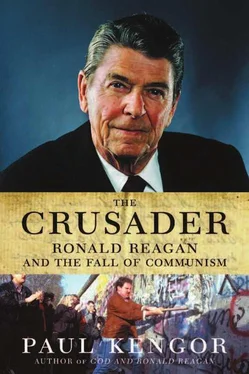1. Reagan, “Interview With Lou Cannon, David Hoffman, and Juan Williams of the Washington Post on Foreign and Domestic Issues,” January 16, 1984. Reagan did not let go: He heralded the operation on its second anniversary in October 1985, seizing the occasion as a continued shot in the arm to the American body politic.
2. Reagan, An American Life, 457–58.
3. He actually began seeing the changes as early as summer 1982, especially in the military. See Reagan, An American Life, 557–58.
4. Reagan, “State of the Union Address,” January 26, 1984. For more such references later, see Reagan, “State of the Union Address,” February 6, 1985; and Frederick J. Ryan Jr., ed., Ronald Reagan: The Wisdom and Humor of the Great Communicator (San Francisco: Collins, 1995), 11.
5. Reagan, “Remarks Upon Returning From the Soviet-United States Summit Meeting in Moscow,” June 3, 1988.
6. He took the time to say so in his Farewell Address on January 11, 1989: “[O]ne of the things I’m proudest of in the last eight years [is] the resurgence of national pride…the recovery of our morale. America is respected again in the world and looked to for leadership.”
1. Jack F. Matlock, Jr., Reagan and Gorbachev (New York: Random House, 2004), 106–7. 2. Reagan, “Remarks to Citizens in Hambach, Federal Republic of Germany,” May 6,
1985.
3. The remainder of this statement said: “To win this struggle, to preserve our way of life, to maintain the peace, we must be strong and true to our ideals. And together we can meet the challenge.” And then, “Future generations, not only in the United States but throughout the hemisphere, will be grateful for what we do today.” Because, said the president, “We’re passing to them the most precious gift of all—liberty.” Reagan, “Remarks at a Fundraising Dinner for Senator Paula Hawkins,” Miami, Florida, May 27, 1985.
4. Gorbachev’s father was a nonbeliever; Reagan’s father was Catholic but largely apathetic. 5. By October 1980, noted Archie Brown, Gorbachev already showed signs of being a “serious reformer.” Now, it looked clear that the reformer was on his way to potentially becoming a future general secretary as well. See Archie Brown, The Gorbachev Factor (New York: Oxford University Press, 1997), ix–x.
6. Interview with Richard Pipes, April 7, 2005.
7. Brown, The Gorbachev Factor, 227–30.
8. Ibid, 4.
9. Said Yuzhin: “[T]he day could come when we might be asked to get rid of Reagan.” See “Boris Yuzhin,” U.S. News & World Report, October 18, 1999.
10. Andropov first met Gorbachev in a visit to the Stavropol territory in April 1969; they subsequently had regular meetings together throughout the 1970s. Brown says they were impressed by each other. As early as 1977, says Brown, Andropov saw Gorbachev as not merely a “brilliant man” but also as a future Soviet leader—four years before Reagan’s presidency. See Brown, The Gorbachev Factor, 50.
11. Interview with Richard Pipes, April 7, 2005.
12. Brown, The Gorbachev Factor, 229–30.
13. Reagan, “Statement on the 40th Anniversary of the Yalta Conference,” February 5, 1985. 14. Thatcher quoted in Ed Feulner, ed., Leadership for America: The Principles of Conservatism (Dallas, TX: Spence, 2000), 11.
15. Brock’s testimony is published in Thompson, ed., Leadership in the Reagan Presidency, Pt II: Eleven Intimate Perspectives, 119.
16. Ambrose: “How Great Was Ronald Reagan? A Symposium,” Policy Review,Fall
1988, 30.
17. Writing in Presidential Studies Quarterly, Andrew E. Busch of the University of Denver argued: “Reagan led to Gorbachev by fundamentally changing the international situation that the Soviet leadership faced.” Busch, “Ronald Reagan and the Defeat of the Soviet Empire,” 455–62. See Shattan, Architects of Victory, 270. Other respected academics, such as Sidney Milkis, Marc Landy, Vladimir Kontorovich, and Russell Bova, have acknowledged the influence of Reagan policy on Gorbachev, his rise, and perestroika. Bova cites Gorbachev’s own words, including a May 1985 speech delivered two months after he came to power. “The necessity for accelerating
1. Sylvain Boulouque in Stephane Courtois et al., The Black Book of Communism (Cambridge: Harvard University Press, 1999), 713–25.
2. Ibid., 712.
3. These refugees began returning only after the post-September 11 U.S. invasion in late 2001, which removed the repressive Taliban government that took root after the Soviet chaos.
4. Selig S. Harrison, “Afghanistan,” in Anthony Lake et al., After the Wars (New Brunswick, NJ: Transaction Publishers, 1990), 45–46; and Boulouque in Courtois et al., The Black Book of Communism, 713–25.
5. That said, an editor told me bitterly: “Reagan gave us the Taliban,” referring to the terribly repressive Islamic regime that ran Afghanistan from 1996 to 2001 and harbored Osama Bin Laden and his September 11, 2001 suicide bombers. This criticism is not just unfair and unwarranted but very shortsighted. The Reagan administration goal was to defeat the Soviets in Afghanistan, not to create the Taliban. More pointedly, while it is true that many of those who made up the Taliban came from the Mujahedin, it is equally true that many of those who opposed and helped to remove the Taliban also came from the Mujahedin. Those anti-Taliban forces included the former Muj fighters who comprised the Northern Alliance, an Afghan coalition that fought alongside U.S. troops in the October–November 2001 overthrow of the Taliban. To charge that “Reagan gave us the Taliban” would be as unreasonable as asserting that Woodrow Wilson produced Hitler. It would be less of a stretch to blame the Soviets for giving the world the Taliban, via the ruination and chaos caused by the Red Army invasion. Ultimately, the emergence of the Taliban can be blamed only on the Taliban. 6. Reagan, “Statement on the Observance of the Afghan New Year,” March 20, 1982.
7. Reagan, “Statement on the Situation in Afghanistan,” December 27, 1981.
8. Reagan, “Remarks on Signing the Afghanistan Day Proclamation,” March 10, 1982; Reagan, “Address at Commencement Exercises at Eureka College,” Eureka, Illinois, May 9, 1982; and Reagan, “Informal Exchange With Representatives of Le Figaro,” December 22, 1983.
9. Among other sources, see the January 1980 letter from Reagan to Edward Langley, in Skinner, Anderson, and Anderson, eds., Reagan: A Life in Letters, 433–34.
10. Schweizer, Victory, 25.
11. Melor Sturua, “Aggressors and Hypocrites,” Izvestia , March 1, 1985, 5, published as “U.S. Conducting ‘Dirty War’ in Afghanistan,” FBIS, FBIS-SOV-5-MAR-85, March 5, 1985, A7–9
12. Reagan, “Statement on the 6th Anniversary of the Soviet Invasion of Afghanistan,” December 27, 1985.
13. On this, see Adelman, The Great Universal Embrace, 136–37, 140–41; D’Souza, Ronald Reagan, 188; Schweizer, Victory, 245–46; and Morris, Dutch, 561–62.
14. Adelman, The Great Universal Embrace, 136–37, 140–41.
15. Morris, Dutch, 561–62.
16. Reagan, “Proclamation 5621—Afghanistan Day, 1987,” March 20, 1987.
17. Moscow radio statement in Persian, published as “Savchenko Scores U.S. Aid to Afghan ‘Ruffians,’” in FBIS, FBIS-SOV-12-MAR-81, March 12, 1981, A1; TASS statement, March 26, 1985, published as “Reagan Remarks on Afghanistan Criticized,” in FBIS, FBISSOV-27-MAR-85, March 27, 1985, D1–2; Melor Sturua, “Aggressors and Hypocrites,” Izvestia , March 1, 1985, 5, published as “U.S. Conducting ‘Dirty War’ in Afghanistan,” FBIS, FBIS-SOV-5-MAR-85, March 5, 1985, A7–9; and Melor Sturua, “Aggressors and Hypocrites,” Izvestia , March 1, 1985, 5, published as “U.S. Conducting ‘Dirty War’ in Afghanistan,” FBIS, FBIS-SOV-5-MAR-85, March 5, 1985, A7–9; and TASS statement, December 29, 1985, published as “Reagan ‘Maliciously Distorted’ Soviet Afghan Policy,” FBIS, 30-DEC-85, December 30, 1985, A6.
Читать дальше












